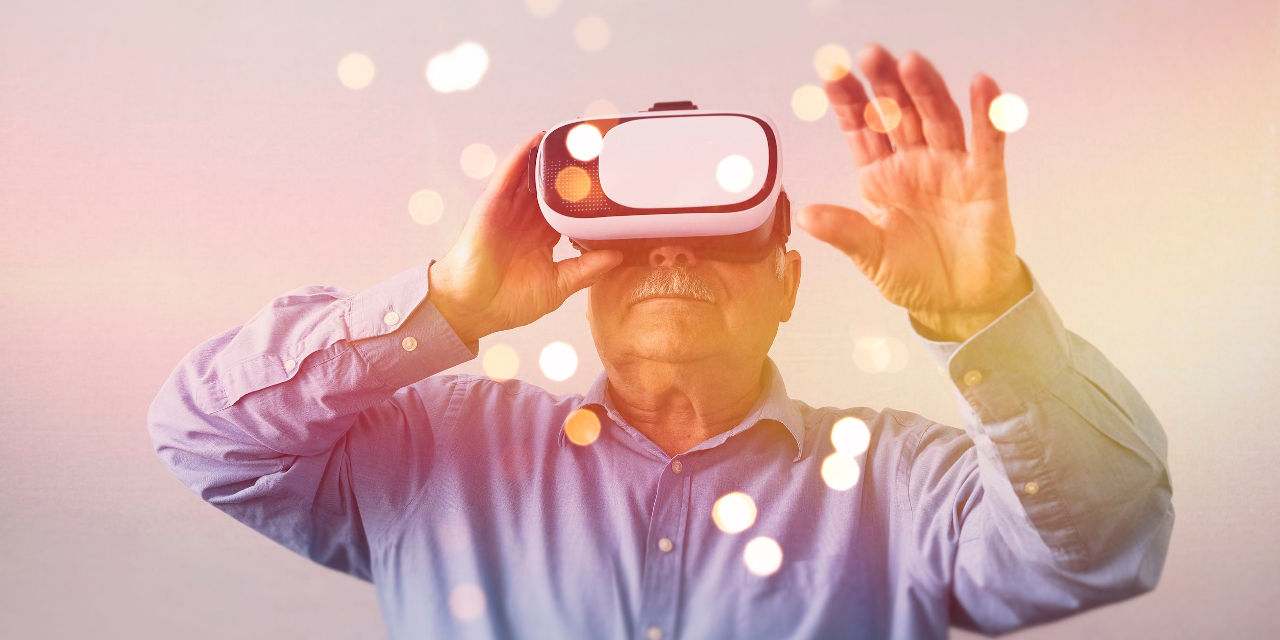By Pam McDonald
The Tech Foresight 2020 event in August offered attendees a look at the advances in tech-driven products, specifically those built for seniors. Rendever showcased its Virtual Reality (VR) platform.
Kyle Rand, the company’s Cofounder and CEO, said: “It’s a social connection tool that helps senior living residents mitigate loneliness and strengthen family relationships by enabling them to experience the endless possibilities of VR in group settings.”
Kyle volunteered in a senior community during his childhood and grew passionate about improving the quality of life for older adults. His first-hand experience inspired him to go on to Duke University, where he completed a dual program in cognitive neuroscience and biomedical engineering, while also studying in two labs – one of which focused on the cognitive decline in the aging population.
VR No Longer Just for Kids and Gamers
Early in his career, Kyle led the development of a research-based social network, created a crowdfunding platform for ecological conservation, and spearheaded a grassroots initiative to increase health care access.
Kyle also saw his family attempting to cope with his grandmother’s dementia, and was more determined to improve long-term care. He shifted his professional focus and connected with others who had experienced similar situations. Together, they cofounded Rendever in 2016.
Once the purview of kids and gamers, a wide variety of applications for VR were being explored. The immersive experience allows users to put on a headset, go anywhere, and do anything. In addition to being a fun and exciting experience for all, Kyle and his team realized that this principle could be life-changing if it were applied to people whose lives have become limited. VR allows seniors to explore the world, check off bucket list items, and revisit places they may have never had the opportunity to see again.
What’s more, they knew it would be way more impactful if it could be experienced together with friends and family. From the very beginning, they hypothesized that the foundation of all human connection is shared, positive experiences – and they built the platform so that the headsets could be networked and offer a synchronized experience for a group of people. This way, participants can talk and connect based on what they’re seeing, how they’re feeling, what they remember, and the memories or stories they’ve heard about their past.
Rendever worked closely with residents, staff, and researchers to bring this platform to life. Today, more than 200 senior living communities and organizations across North America offer Rendever. Staff has facilitated nearly 700,000 experiences for thousands of older adults across 10,000 sessions.
As Rendever has grown and scaled, they have built commercial partnerships with major organizations like AARP and Verizon, worked with world-class healthcare systems such as UCHealth and Cleveland Clinic, created once-in-a-lifetime experiences thanks to major brands like the New England Patriots and Magnolia Bakery, and Kyle was named to Forbes’ 30 Under 30 List.
Loneliness Takes A Toll, Especially on Seniors
Many studies show that prolonged loneliness increases depression, hypertension, cognitive decline, and immunosuppression, as well as the risk for stroke and heart attack. After a two-year process, Rendever was awarded a grant from the National Institutes on Health (NIH) to conduct research around using VR as a family engagement tool with memory care patients and their adult children who live at a distance.
They teamed up with Dr. Tamara (Tammy) Afifi, and her researchers at the University of California Santa Barbara. Tammy’s research focuses on health communications, including how stress impacts personal and relational health. She points out that according to attachment theory, human beings want to feel loved and that they belong. Family is the most essential social bond and, for senior living residents, it’s the primary thing they seek to ease social isolation.
The goal of the study is to demonstrate that VR can be an “innovative, drug-free, and increasingly affordable tool to help older adults maintain important relationships, even from a distance.”
Preliminary Results Are Positive
They organized a number of resident-family member dyads, established “wellness” baselines for participants, and then led them in 3 VR sessions once a week for 3 weeks. They took a travel adventure, made a visit to the seniors’ childhood home, and looked together at family photos and videos.
By March of this year, they had gathered about half of their research data when the U.S. was locked down in an effort to slow the spread of COVID-19. Suddenly people everywhere were struggling to cope with social isolation and loneliness – a reality of aging today for many seniors.
Even with incomplete data, the findings are clearly positive. The senior living residents who participated reported increased positive emotions and decreased negative ones. The family member participants, who sometimes were also caregivers, reported favorable responses, including reduced caregiver guilt, fewer depressive symptoms, and improved mental health.
Tammy, Kyle, and their teams have recently submitted the Phase II application as a clinical trial to expand the study in 2021 to many more senior living communities and evaluate both short- and long-term impacts on residents, family members, and the dyadic relationship.
Delivering Magic Moments
During their session at Tech Foresight 2020, Kyle said, “Experiential technology is a key component of how we define our new normal. As we look to the future, it’s going to be even more important that companies like Rendever, researchers like Tammy, and all operator groups really work together to figure out how we can best deliver positivity and magic moments.”
To learn more, visit www.rendever.com.
To watch this session, and all the sessions from Tech Foresight 2020, please register here.








